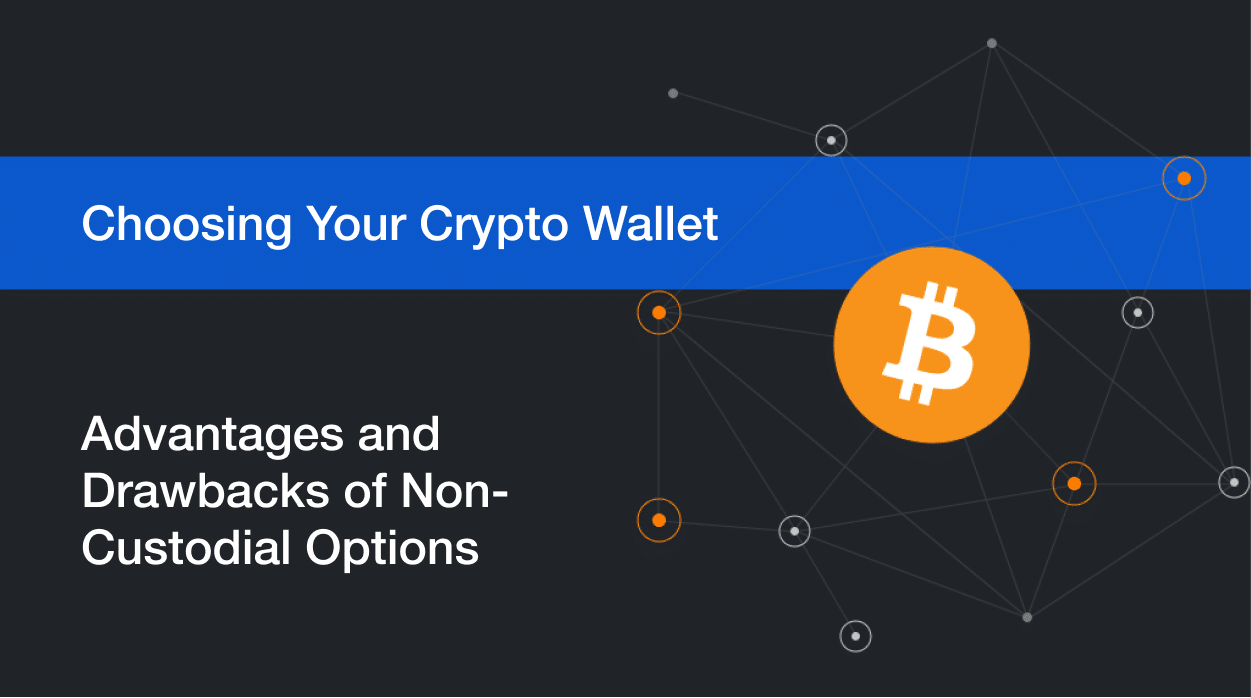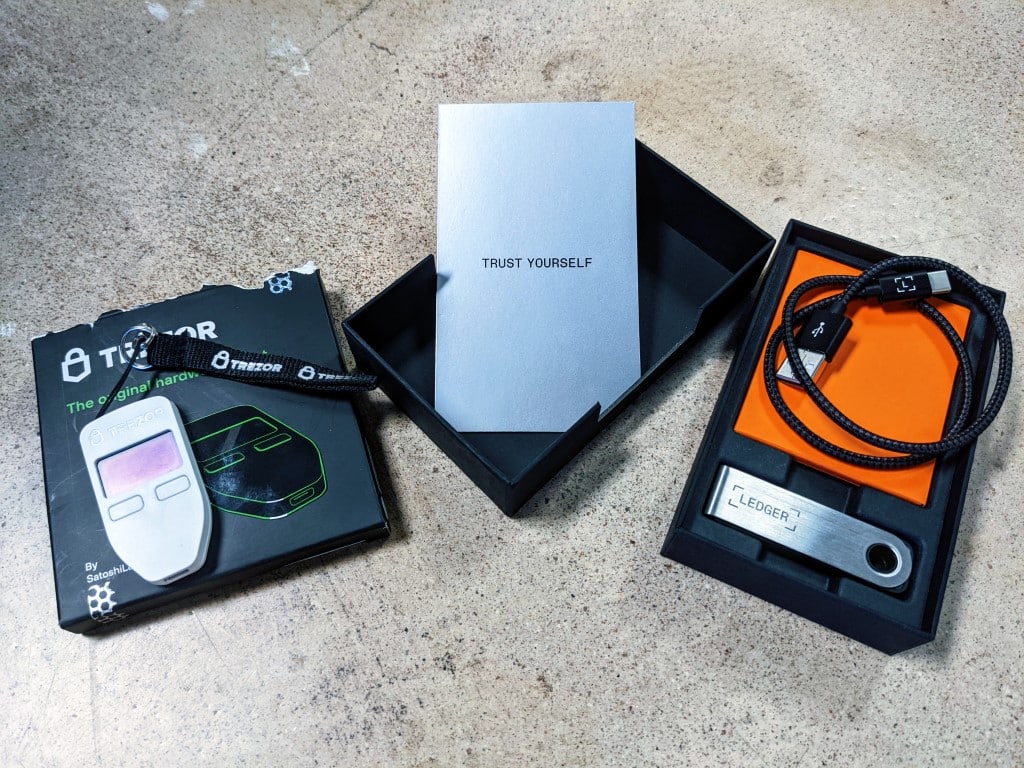
Non-Custodial Wallet Pros and Cons
How do you want to store and manage your crypto? This post covers the pros and cons of non-custodial wallets.
When deciding whether to manage crypto yourself or use an exchange, there are big factors to consider. Let’s dive on in and help identify the best option for you.
What is “non-custodial” in crypto?
In the traditional finance world, a bank holds the majority of your money. They have “custody” of your money. The bank provides security, insurance, and transaction ease.
A non-custodial form of managing your traditional money would be shoving all of your cash under a mattress. While this keeps it in your control, it comes with a lot of problems. Someone could break into your house and steal all of that cash. Your house could burn down, taking your cash with it. And transactions would be tough. Forget receiving a paycheck and making purchases online.
For many reasons, banks are a standard part of traditional finance and add considerable value. We trust them with our wealth and our debt. In this way, it’s natural to think of cryptocurrency in the same manner.
However, cryptocurrency is unique because it allows you to store wealth and transact easily without relying on a third party. You can be your own bank and still participate in the global economy.

Non-custodial wallets are core to the value propositions of Bitcoin.
With non-custodial, you have control of your crypto wallet details, including the recovery seed, passphrase, PIN, and related devices. You operate it and interact with other entities on the blockchain.
What are crypto exchanges and financial institutions?
Crypto financial institutions, which we’ll just call exchanges, can hold your cryptocurrency for you. Many of them look just like regular banks. They may even offer many of the same services, such as interest-bearing savings accounts, credit cards, loans, exchanges, and more.
This list includes companies like Coinbase, Binance, Gemini, Blockfi, and many more.
When you use an exchange, you are giving custody of your crypto to a company, which is where the counter-term non-custodial comes from.
Most people start their crypto journey by buying on an exchange. Given the convenience and familiarity, it’s easy to stay and never venture into non-custodial wallets.
After all, exchanges should provide a variety of value-add services similar to traditional banks. This includes items such as security, compliance, reporting, expertise, and support.
However, unlike traditional banks, crypto exchanges add a variety of risks. They are minimally regulated, do not typically carry insurance to cover lost funds, and may not fully understand the risks of their activities as the industry rapidly evolves.
If you have cryptocurrency on an exchange, that exchange has custody of your funds. They are adding value by taking the burden of managing your own wallet.
Non-custodial wallet pros and cons
Whether you take custody of your crypto or you leave that to a 3rd-party is your choice. While there’s a lot of value in managing your own crypto, it’s also a tremendous responsibility that should be taken lightly.
The remainder of this post will cover the pros and cons of doing so.
Non-custodial wallet pros
Important: the list of pros here is much shorter than the cons. Despite the size of the lists, the benefits of self-custody may significantly outweigh the cons.
You are fully in control
This is the big one. This is what the phrase not your keys, not your crypto is all about. You are solely responsible for your wallet.
By managing your own wallet, you are minimizing your exposure to the risk of mistakes and malicious actions of a third party (the exchange or its partners). You may see this referred to as minimizing counterparty risk.
Crypto experience
Managing your own wallet bumps you out of amateur status immediately. You are using crypto, namely Bitcoin, as it was meant to be used. And you’ll now be welcomed in all of the secret meetings.
From the Bitcoin Whitepaper:
What is needed is an electronic payment system based on cryptographic proof instead of trust, allowing any two willing parties to transact directly with each other without the need for a trusted third party.
Satoshi Nakamoto
You’ll interact directly with the public blockchain, learn the terms, and build first-hand experience that will ultimately give you a better understanding of the entire crypto industry and finance in general.
Hold and reduce stress
One benefit that is rarely discussed is by increasing the complexity of accessing and moving your crypto, you may be more likely to invest rather than trade. You may hold your coins, not worry about day-to-day fluctuations, see better performance in your accounts, and dramatically reduce your stress.

Non-custodial wallet cons
Physical security responsibility
We’ve all heard the stories:
- 8,000 Bitcoin lost in a landfill (gizmodo.com).
- Safe with $4M in Bitcoin stolen (nzherald.co.nz).
To effectively store your crypto, you need to study up on the best ways to physically secure your seed, any other wallet details, and your hardware devices. Ineffectively managing physical security may lead to loss or theft.
Digital security responsibility
More complex than physical security is digital security. Crypto is a massive target for ever-evolving malware and social engineering campaigns. Even exchanges with dedicated digital security experts struggle.
- Bitfinex hackers stole 119,756 bitcoin in 2016 (wikipedia.com).
- Recently in 2022, hackers stole $34 million from Crypto.com. See this and details on 48 other exchange hacks at hedgewithcrypto.com.
The exchange hacks occurred from many different vectors, such as obtaining access to hot wallets, malware, employee mistakes, social engineering, and vulnerabilities in systems.
Individuals are prone to all of these types of attacks. You may not patch and protect your systems with rigor. You may be more prone to mistakes than professionals.
This thread on Reddit is from a person who just lost $88,000 worth of crypto on MetaMask likely due to some form of malware. It highlights how real this risk is.
Loss
As already mentioned in physical and digital security, the risk of total loss is real. In addition to the two previous cons, any movement of cryptocurrency is considered “final settlement.” Banks take many days to process transactions and even have policies to reverse transactions if you change your mind. But with crypto, there are no reversals. It’s possible to make a simple mistake and completely lose your funds.
No support
If you run into an issue with the management of your crypto, there is no one to escalate the issue to but yourself. It is possible you’ll be stuck and lose your crypto.

If you forget or lose your password for an exchange, they will have a support process to recover access. However, if you lose your wallet details and did not take proper precautions, there is no recovery.
Yield complexity
As we mention throughout this website, great investors do not rely on appreciation alone. They want to also see cash flow.
Some exchanges, such as Binance, make earning yield incredibly easy. You can simply click a “stake” button and start earning. They have vetted the behind-the-scene solution, reviewed the contracts, and automated the complexity.
To earn yield via self-custody, you need to perform extensive due diligence, understand risks, and perform complex steps to get up and running.
Read our post How to Stake With a Ledger to Earn Crypto as a great starting point.
Third-party creep
Non-custodial wallets are extremely basic. They allow you to store, send, and receive.
However, you can add capabilities by installing or connecting to a variety of apps. Each time you do this, you are adding some degree of risk. Ultimately, you may end up “trusting” countless third parties, drifting away from your initial goal.
Probably still need an exchange
If store your crypto in your non-custodial wallet, you still need a way to get it there. Unless you earn your money in crypto, you’ll likely never fully escape exchanges.
This means you still have to find an exchange you trust. You still need to perform KYC (know your client). And ultimately, your addresses will be known and your crypto transactions can be tracked and taxed.
Cost
While it’s possible to have a software-only wallet (hot wallet), hardware wallets like Trezor and Ledger offer considerably more security. If you have a balance that is significant to you, you will want to purchase a hardware wallet to minimize numerous risks.
In addition to hardware, you will likely face more fees. When you move crypto around within an exchange, they’re oftentimes just moving numbers in a database; they are not performing actual blockchain transactions. Similarly, exchanges may cover numerous blockchain fees as a way to acquire customers and be competitive.
Some examples of fees:
- If you invest in crypto every month, you will need to bring your money onto an exchange, buy the crypto, and then transfer it to your wallet. Each step may have a fee.
- If you stake, claiming your reward will incur a transaction fee, which can be larger than the reward.
Wallets may have apps that let you connect to a service and buy crypto more directly. Both those services typically have their own transaction fees and surprisingly bad market prices. This means exchanges such as Binance may quote you $30,000 to buy Bitcoin, but the wallet option quotes you $30,600.
Summary
If you choose to use a non-custodial wallet, congratulations! Just understand you are taking a considerable amount of responsibility. Any mistake or gap on your end may result in the loss of your crypto. But if you take self-custody seriously and follow best practices, you’ll experience crypto in its highest-and-best form.
If you choose to store your crypto on an exchange, put time and effort into selecting your exchange. Ideally, select a big, established company that is leading in terms of transparency and compliance. There are numerous legitimate exchanges that add considerable value. But there has also been a history of failures and bad actors.
Ready to start? Here are crypto wallet best practices you need to know.
Did we miss any pros or cons? Let us know in the comments below.
Subscribe to the Newsletter
Join 7k+ working professionals to "The Five-Year Plan". Every Saturday morning, you'll receive one actionable tip to create life-changing wealth in crypto.